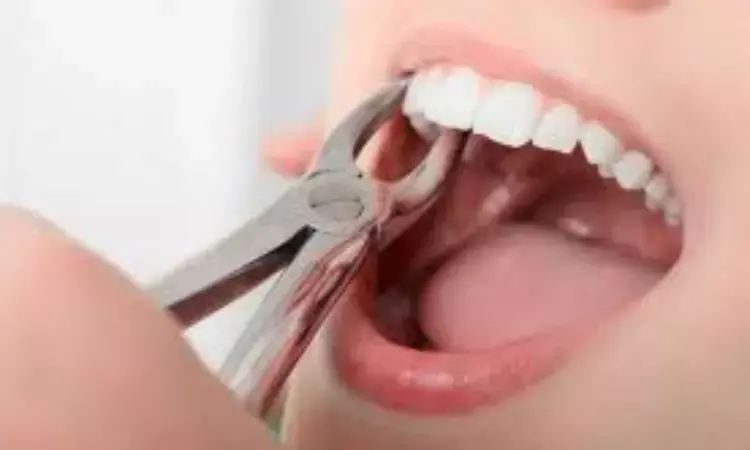- Home
- Medical news & Guidelines
- Anesthesiology
- Cardiology and CTVS
- Critical Care
- Dentistry
- Dermatology
- Diabetes and Endocrinology
- ENT
- Gastroenterology
- Medicine
- Nephrology
- Neurology
- Obstretics-Gynaecology
- Oncology
- Ophthalmology
- Orthopaedics
- Pediatrics-Neonatology
- Psychiatry
- Pulmonology
- Radiology
- Surgery
- Urology
- Laboratory Medicine
- Diet
- Nursing
- Paramedical
- Physiotherapy
- Health news
- Fact Check
- Bone Health Fact Check
- Brain Health Fact Check
- Cancer Related Fact Check
- Child Care Fact Check
- Dental and oral health fact check
- Diabetes and metabolic health fact check
- Diet and Nutrition Fact Check
- Eye and ENT Care Fact Check
- Fitness fact check
- Gut health fact check
- Heart health fact check
- Kidney health fact check
- Medical education fact check
- Men's health fact check
- Respiratory fact check
- Skin and hair care fact check
- Vaccine and Immunization fact check
- Women's health fact check
- AYUSH
- State News
- Andaman and Nicobar Islands
- Andhra Pradesh
- Arunachal Pradesh
- Assam
- Bihar
- Chandigarh
- Chattisgarh
- Dadra and Nagar Haveli
- Daman and Diu
- Delhi
- Goa
- Gujarat
- Haryana
- Himachal Pradesh
- Jammu & Kashmir
- Jharkhand
- Karnataka
- Kerala
- Ladakh
- Lakshadweep
- Madhya Pradesh
- Maharashtra
- Manipur
- Meghalaya
- Mizoram
- Nagaland
- Odisha
- Puducherry
- Punjab
- Rajasthan
- Sikkim
- Tamil Nadu
- Telangana
- Tripura
- Uttar Pradesh
- Uttrakhand
- West Bengal
- Medical Education
- Industry
Antibiotic prophylaxis not completely effective for post-extraction complications, States study

A new study published in the Journal of Public Health Dentistry found mild protective impact of antibiotic prophylaxis against post-extraction problems or subsequent medical care usage. For many dentists, extracting a tooth is a standard practice. Even though it's a popular therapy, there is a chance that it can cause postoperative problems including discomfort, edema, and trismus and other issues. Due to the possibility of dry socket (DS) and surgical site infection (SSI), tooth extraction is considered a clean-contaminated procedure. Therefore, prophylactic antibiotics have long been used by dentists to avoid DS and SSI.
Amoxicillin, either by itself or in conjunction with clavulanic acid, is the most often prescribed antibiotic for preventing postoperative infection following extraction. Prophylactic antibiotic use is useful in preventing problems in high-risk patients and is recommended when there is an active infection during surgery. Therefore, this study by Jessina McGregor and colleagues assessed the relationship between the Veterans Affairs Healthcare System's antibiotic prophylaxis and unfavorable outcomes after tooth extraction.
This study used a retrospective cohort analysis of individuals who had tooth extractions from 2015 to 2019 for this investigation. Prophylactic use of antibiotics was the primary exposure. Alveolar osteitis and surgical site infections were examples of post-extraction complications that occurred within seven days. Subsequent medical care for an oral problem that occurred within seven days was the secondary outcome. Antibiotic prophylactic was evaluated for its independent impact on each outcome using multivariable logistic regression models.
122,810 (31.8%) of the 385,880 dental extraction visits involved antibiotic prophylaxis. In all, 3387 (0.9%) people had a post-extraction oral problem, and 350 (0.09%) people sought medical attention for it within a week. Diabetes was a statistically significant (p = 0.01) impact modifier in multivariable analysis of the relationship between antibiotic prophylaxis and post-extraction complications.
Antibiotic prophylaxis was shown to be substantially related with a higher likelihood of post-extraction complications among visits from patients without diabetes, but no significant effect was seen when it came to visits from patients with diabetes. Also, prophylactic antibiotic use did not substantially correlate with post-extraction healthcare. Overall, the results indicate that it might be time to reevaluate the widespread application of antibiotics in such low-risk situations, given problems only occurred in 0.9% of instances. Antibiotics had no discernible impact on complications in diabetic individuals.
Source:
McGregor, J. C., Wilson, G. M., Gibson, G., Jurasic, M. M., Evans, C. T., & Suda, K. J. (2024). The effect of antibiotic premedication on postoperative complications following dental extractions. In Journal of Public Health Dentistry. Wiley. https://doi.org/10.1111/jphd.12634
Neuroscience Masters graduate
Jacinthlyn Sylvia, a Neuroscience Master's graduate from Chennai has worked extensively in deciphering the neurobiology of cognition and motor control in aging. She also has spread-out exposure to Neurosurgery from her Bachelor’s. She is currently involved in active Neuro-Oncology research. She is an upcoming neuroscientist with a fiery passion for writing. Her news cover at Medical Dialogues feature recent discoveries and updates from the healthcare and biomedical research fields. She can be reached at editorial@medicaldialogues.in
Dr Kamal Kant Kohli-MBBS, DTCD- a chest specialist with more than 30 years of practice and a flair for writing clinical articles, Dr Kamal Kant Kohli joined Medical Dialogues as a Chief Editor of Medical News. Besides writing articles, as an editor, he proofreads and verifies all the medical content published on Medical Dialogues including those coming from journals, studies,medical conferences,guidelines etc. Email: drkohli@medicaldialogues.in. Contact no. 011-43720751


